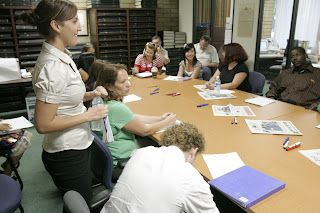Just posted by Peter Scheer, lawyer, journalist and executive director of the California First Amendment Coalition: "Tracy case tests the power of government officials to avoid disclosure of their e-mails on public business. Fed up Tracy residents should refuse to pay the officials’ legal fees."
By the way, there was a hearing May 23 on the Tracy Press' public records lawsuit against the city, and we are awaiting Judge Lauren Thomasson's ruling.
Comments on all things journalism and answers to questions from readers about news coverage and operations at the Tracy Press.
Tuesday, May 29, 2007
Friday, May 18, 2007
Ugh — mistakes
We make mistakes just like everyone else, but here's a really bad one from the Ottowa Citizen — http://www.regrettheerror.com/2007/05/citizen.html
Thursday, May 17, 2007
Outsourced reporting from India, oh my!
I just got back from a trip and found printouts and clippings of this Associated Press story waiting for me on my desk. Apparently, a Web site has hired journalists in India to cover news in Pasadena (although now I see the publisher has postponed his plan because he's been so overwhelmed by the resulting media storm that he hasn't had time to train the new reporters).
How will these noncommuters from Mumbai and Bangalore cover the city government beat from the other side of the world? They'll watch the televised council meetings on the Internet and e-mail the stories they write after watching. And they'll do it for far less money than an American reporter would be paid.
I can't say it any better than Bryce Nelson, a University of Southern California journalism professor, who told AP, "Nobody in their right mind would trust the reporting of people who not only don't know the institutions but aren't even there to witness the events and nuances. This is a truly sad picture of what American journalism has become."
How will these noncommuters from Mumbai and Bangalore cover the city government beat from the other side of the world? They'll watch the televised council meetings on the Internet and e-mail the stories they write after watching. And they'll do it for far less money than an American reporter would be paid.
I can't say it any better than Bryce Nelson, a University of Southern California journalism professor, who told AP, "Nobody in their right mind would trust the reporting of people who not only don't know the institutions but aren't even there to witness the events and nuances. This is a truly sad picture of what American journalism has become."
Tuesday, May 08, 2007
Intern Night at the TP
Friday, May 04, 2007
Federal shield law is needed
This week, companion bills called the "Free Flow of Information Act" were introduced by Senators Christopher Dodd, D-Conn., and Richard Lugar, R-Ind., and
Representatives Richard Boucher, D-Va., Mike Pence, R-Ind., John Conyers, D-Mich.,
Howard Coble, R-N.C., John Yarmuth, D-Ky., and David Weldon, R-Fla.
Here's the text of the bill (the House and Senate versions are identical) as introduced and a section-by-section analysis. Thirty-two states, including California, already have shield laws. Federal courts, however, have no uniform standards to govern when testimony can be sought from reporters. By passing this act, Congress would establish balanced ground rules for reporters as they seek to bring forward information on matters of public interest.
Representatives Richard Boucher, D-Va., Mike Pence, R-Ind., John Conyers, D-Mich.,
Howard Coble, R-N.C., John Yarmuth, D-Ky., and David Weldon, R-Fla.
Here's the text of the bill (the House and Senate versions are identical) as introduced and a section-by-section analysis. Thirty-two states, including California, already have shield laws. Federal courts, however, have no uniform standards to govern when testimony can be sought from reporters. By passing this act, Congress would establish balanced ground rules for reporters as they seek to bring forward information on matters of public interest.
Wednesday, May 02, 2007
Subscribe to:
Comments (Atom)


